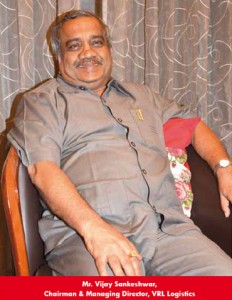 VRL Logistics is one of India’s largest logistics companies with a fleet strength of over 3000 vehicles. From a humble beginning in 1976, with a vision that was way ahead of its time, VRL currently has presence in almost every State in the country and has grown into a nationally-renowned logistics and transport company.
VRL Logistics is one of India’s largest logistics companies with a fleet strength of over 3000 vehicles. From a humble beginning in 1976, with a vision that was way ahead of its time, VRL currently has presence in almost every State in the country and has grown into a nationally-renowned logistics and transport company.
Over the years, VRL has pioneered in providing a safe and reliable delivery network in the field of parcel service. It has spread its operations to Courier Service, Express Cargo & Air Chartering to meet the growing demand of the burgeoning customer base.
In an exclusive interview to MOTORINDIA, Mr. Vijay Sankeshwar, Chairman and Managing Director, VRL Logistics, highlights the key aspects of his company’s growth and certain secrets behind the apparently unparalleled success of VRL.
Power of people
VRL is known for its extremely good management-employment relationship. The company offers high salary packages to its employees which helps build an easy-to-retain and loyal employee base.
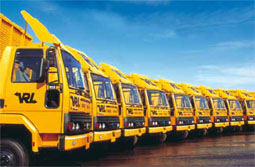 Mr. Vijay Sankeshwar says: “We attribute our success to each one of our employees. We always look at the long-term and believe in long-term relationship with our employees, customers and financiers. We are not affected by the price war in the market because we never compromise on quality. We deliver what we promise.”
Mr. Vijay Sankeshwar says: “We attribute our success to each one of our employees. We always look at the long-term and believe in long-term relationship with our employees, customers and financiers. We are not affected by the price war in the market because we never compromise on quality. We deliver what we promise.”
Mr. Anand Sankeshwar ably supports his father as the Managing Director of VRL. The company values the service of experienced campaigners with abundance of knowledge on the industry and is known for employing retired people who have the drive left in them to work for the industry. Mr. Bhatt is its CTO and is with the company for 15 years.
Mr. Umesh is its COO, serving the company for over three decades. Mr. Sankeshwar was indeed very humble in attributing his company’s success to the dedicated and sincere service of the workforce over the years.
VRL is currently the largest private fleet owner in India with a fleet size of 3860 vehicles which includes 550 tourist buses and 3310 goods transport vehicles. The company finds mention in the Limca Book of Records as the single largest fleet owner of commercial vehicles in the private sector in India. The passenger carrier fleet includes 130 Volvo coaches while the cargo carrier fleet includes nearly 2500 Ashok Leyland vehicles, which reflect its trust and confidence on the Ashok Leyland and Volvo brands.
The company has recently bought 20 BharatBenz trucks which are currently plying between Mumbai and South India. It has a good number of Tata Aces for last mile transport and is likely to place an order for some Ashok Leyland DOST vehicles soon. With 85 per cent of its total turnover coming from goods transportation, the company is looking to consolidate its presence in the segment, while continuously expanding its passenger carrier fleet.
VRL has also entered the car-carrier segment and currently has 102 car carriers in its fleet. Though initially the segment attracted good response, owing to the slump in car sales off late, the demand has slowed down. The car-carrier segment though being a very important one reveals some shocking numbers. Out of the 14,000 car carriers in the country, less than 500 are in compliance with the Motor Vehicles Act. Legally speaking, the car carriers should at most be 18.75 metre long, while most of the carriers are over 22 metre long which is a huge cause of concern. Despite adhering to the rules, organised players face the heat owing to the various loopholes in the industry which are exploited by unorganised and unethical players.
Unique policy
When it comes to targets and plans, VRL is a company which has its own unique way of operation. In fact, the company does not have huge business targets and turnovers. The main targets are fixed for its drivers who are given an incentive bonus for every punctual trip. The reward increases if he manages to cover the distance before the stipulated time. The company operates on a strategy of catering to the logistics requirements of clients in different fields which reduces the risk of high dependence on a particular sector.
A fleet of over 3,500 vehicles calls for around 7,000 drivers. Though VRL has rarely faced driver shortage, thanks to its high salary packages and good relationship with the driver community, the industry is in a spot of bother when it comes to drivers. Expressing his views on the issue, he says: “The number of drivers needed is twice the vehicle production count and currently there is a 40 per cent driver shortage in India. The vehicle manufacturers and the government need to act quickly as the dearth might rise to 80 per cent and result in making the industry come to a standstill.” The existing rule that a driver could drive a heavy vehicle only after a period of three years after obtaining a light vehicle license is far from justified and as a result, poses a big threat to dissuading people from taking to commercial vehicle driving.
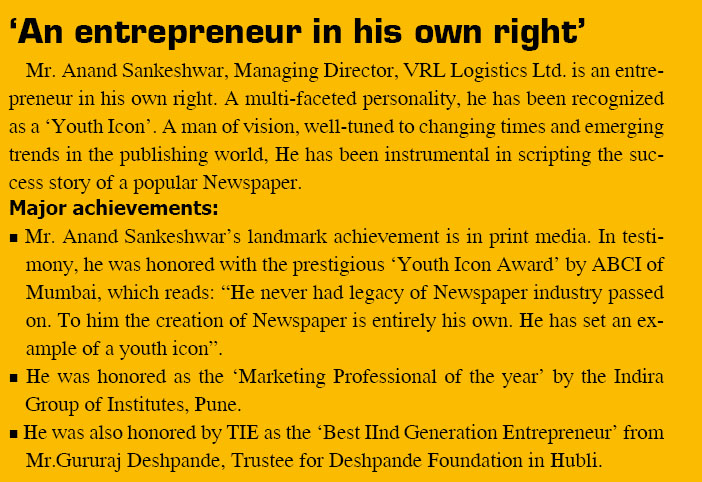 IPO deferred
IPO deferred
Despite fluctuating market conditions, VRL has maintained a growth of 15 per cent in the last year. The company has been constantly expanding its fleet strength and network size and in a move to fuel further expansion, the company decided to go for an IPO four years ago. However as the public issue dates neared, the market was badly hit, forcing the IPO to be shelved. A second IPO bid in March 2011 did not fructify either, after which the company dropped the decision of going public.
Following the IPO deferral, New Silk Route (NSR), an American company had invested Rs. 175 crore in VRL few months ago which came as a shot in the arm for the company’s growth prospects. Says Mr. Sankeshwar: “We are not worried about the financial factor because we always follow a fair policy and our relationship with finance companies is very good. We have about 25 banking companies, NBFCs and co-operative companies who offer us good support. Following the recent Rs. 175 crore investment by NSR, we are not looking at IPO for the next three years.”
Warehousing solutions
Third-party logistics and warehousing solutions offered by VRL are tailor-made and cater to unique needs of various customers of the industry. With the largest network in India, the VRL parcel service is indispensable for a large number of corporate houses. The company’s network spans the length and breadth of the country and is supported by large number of transhipment hubs.
VRL has a 43-acre transport-cum-warehouse complex at Varur, Hubli. The unique facility has all the essential back-up services under one roof, including a transhipment godown, workshop, canteen, drivers’ rest room, own diesel bunk and parking area. The company has a total of 42 warehouses at different locations catering to different regions across India.
Focal point of activity
VRL has a warehouse in Bangalore which acts as a connectivity hub for the north, east, west and south regions. The three lakh sq. feet large warehouse, spread over seven acres of land is the company’s largest and perhaps the country’s too. The warehouse is buzzing with activity, more during the nights and towards the wee hours of the morning when most of the transaction takes place.
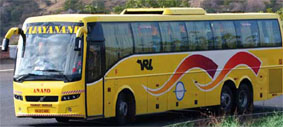 Being one of VRL’s largest warehouses, it receives consignments from across the country which are segregated for dispatch according to the region and as per priority. The Express Cargo division, whose vehicles are given first priority, has a dedicated team servicing the entire country through 15 primary routes. The division is known for its prompt service, with vehicles departing exactly on time immaterial of conditions and circumstances.
Being one of VRL’s largest warehouses, it receives consignments from across the country which are segregated for dispatch according to the region and as per priority. The Express Cargo division, whose vehicles are given first priority, has a dedicated team servicing the entire country through 15 primary routes. The division is known for its prompt service, with vehicles departing exactly on time immaterial of conditions and circumstances.
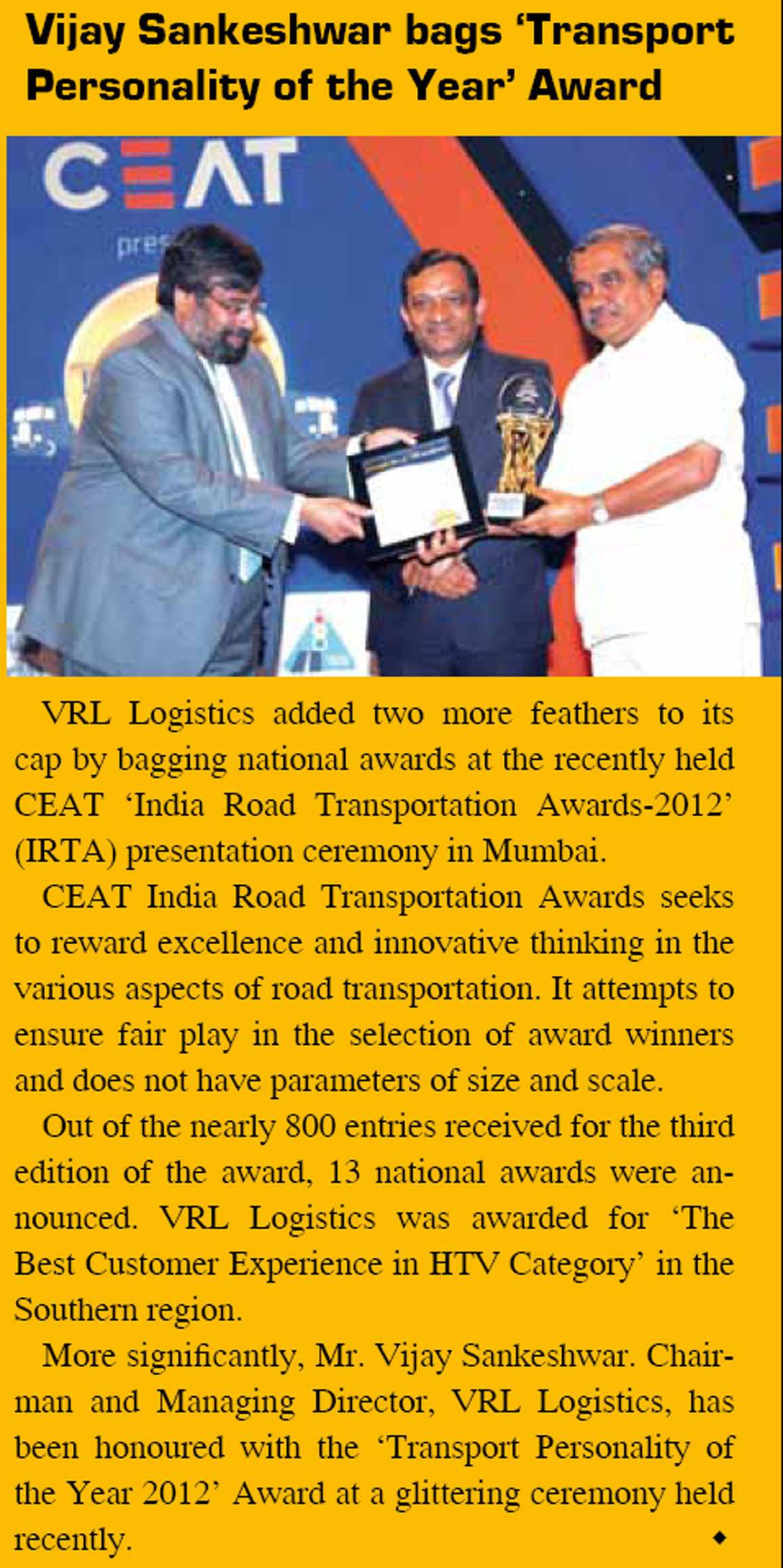 Operational since October 2008, the warehouse normally has close to 1,000 people in its premises round the clock as vehicles keep moving in and out. On an average, the centre receives around 460 vehicles every day with a transaction of nearly 4,000 tonne, 50 per cent of which caters to the requirements of Karnataka. The state’s capital Bangalore is served through 23 delivery points and 35 booking points using a local fleet of 107 vehicles. The warehouse primarily uses forklifts and hand-trolleys to move the consignments while it also has a crane to transfer huge ones. With business growing rapidly, VRL is looking to expand the warehouse to four lakh sq. feet area, to be able to cope up with the rising logistics demand.
Operational since October 2008, the warehouse normally has close to 1,000 people in its premises round the clock as vehicles keep moving in and out. On an average, the centre receives around 460 vehicles every day with a transaction of nearly 4,000 tonne, 50 per cent of which caters to the requirements of Karnataka. The state’s capital Bangalore is served through 23 delivery points and 35 booking points using a local fleet of 107 vehicles. The warehouse primarily uses forklifts and hand-trolleys to move the consignments while it also has a crane to transfer huge ones. With business growing rapidly, VRL is looking to expand the warehouse to four lakh sq. feet area, to be able to cope up with the rising logistics demand.
The warehouse has a workshop for in-house repairs where around 40 vehicles are serviced every day. A fleet of 150 spare vehicles is lined up in the centre for emergency use. The centre has a huge inventory of spare parts and also has a spare engine and additional tyres for emergency. It also has a tyre section for inspection of tyres, where 25 to 30 tyres are replaced every day. The huge fleet strength expectedly consumes huge volumes of fuel every day, 18,000 litres to be precise, amounting to a whopping Rs. 8,00,000 per day! The company has IndianOil Corporation (IOC) as its primary fuel partner, catering to 95 per cent of the requirement.
Division in the Bangalore Warehouse:
• Express Cargo Division
• Door Delivery Division
• Karnataka State Division
• Other States Division (states other than Karnataka)
• Local Division (within Bangalore)